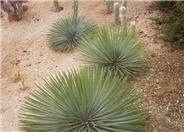
Common name:Our Lord's Candle
Botanical name:Hesperoyucca whipplei
Stemless, it produces dense clusters of rigid, gray green leaves 12"-18" long. Its drooping, bell-shaped flowers appear on large, branched spikes 3'-6' long. Plants die after blooming, much like Agaves, but only individual rosettes will die off; others in clump will continue to live and eventually bloom. Overall plant grows 3' tall and 6' wide. This CA native prefers well drained soil and is drought tolerant but will lose lower leaves with extended drought..
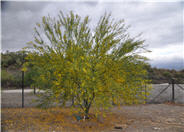
Common name:Mexican Palo Verde, Jerusalem Thorn
Botanical name:Parkinsonia aculeata
The Mexican Palo Verde has prickly stems. This tree is very fast growing with sparse foliage and very long narrow leaves. Yellow flowers with orange red throats bloom sporadically. It is very messy, thorny, weedy and short-lived. This tree is usually found on limestone soils in areas with moisture but is strongly drought tolerant. It can withstand saline conditions. It can be cold or drought deciduous. It is beautiful in form being light and airy looking, with green bark.
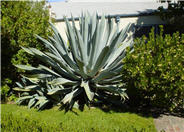
Common name:Century Plant, Maguey
Botanical name:Agave americana
This plant is fast growing to about 6'-10' tall and 8'-13' wide. Wide gray leaves have stiff terminal spines and recurved teeth on margins. It prefers full sun and well-drained situations. After blooming, which could take several years, it will die but will send up new pups from around the base. Some people are allergic to the sap. Removal is difficult if unwanted.
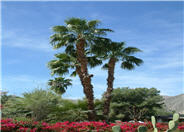
Common name:Mexican Fan Palm
Botanical name:Washingtonia robusta
The Mexican Fan Palm is a very tall, rapidly growing palm with large, fan-shaped leaves. It has a tropical look, and can grow several feet a year. This species is excellent for larger gardens and lining streets and avenues.
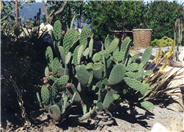
Common name:Mission Fig
Botanical name:Opuntia ficus-indica
This Opuntia is more tree-like than other types; it grows to15' tall. It usually has no spines but some glochids can be found. Flowers are yellow to orange in late spring and early summer. Fruit is edible. It does best in full sun and is frost sensitive. It needs well drained soil. The major pest and source of the red dye cochineal comes from a scale.
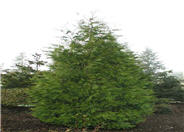
Common name:Incense Cedar
Botanical name:Calocedrus decurrens
The Cedar is an attractive, stiff, narrow evergreen tree which has a columnar growing pattern and maintains a central leader. The foliage is comprised of imbricate-scales, while the coarse bark has an attractive cinnamon red-brown coloring. The cedar retains its color in winter and under good cultural conditons, will maintain its foliage to the ground. It serves as an effective screening evergreen, and contrasts well with Maples and other deciduous trees and flowering plants.
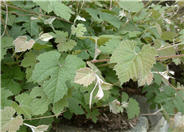
Common name:California Wild Grape
Botanical name:Vitis californica
The California Wild Grape is a woody deciduous vine that with round large leaves. The flowers are in small fragrant blooms and berry clusters appear in the summer. This vine has a sprawling, climbing growth habit. The California wild Grape is native to California and is drought tolerant. It will cover up fences nicely. Grapes are ornamental.
| Designer: Descanso Gardens | Rest Stop |
Photographer: GardenSoft |
Soils and Compost:
Incorporate compost 6" into your soil to retain water, reduce compaction, feed earthworms, and provide valuable nutrients to your plants.
Water Saving Tip:
Apply as little fertilizer as possible.
If you use fertilizer make sure it stays on the landscape, and carefully water it in so there is NO runoff.
Integrated Pest Management:
Drip and other smart irrigation delivers water directly to roots, allowing no excess water for weeds.
